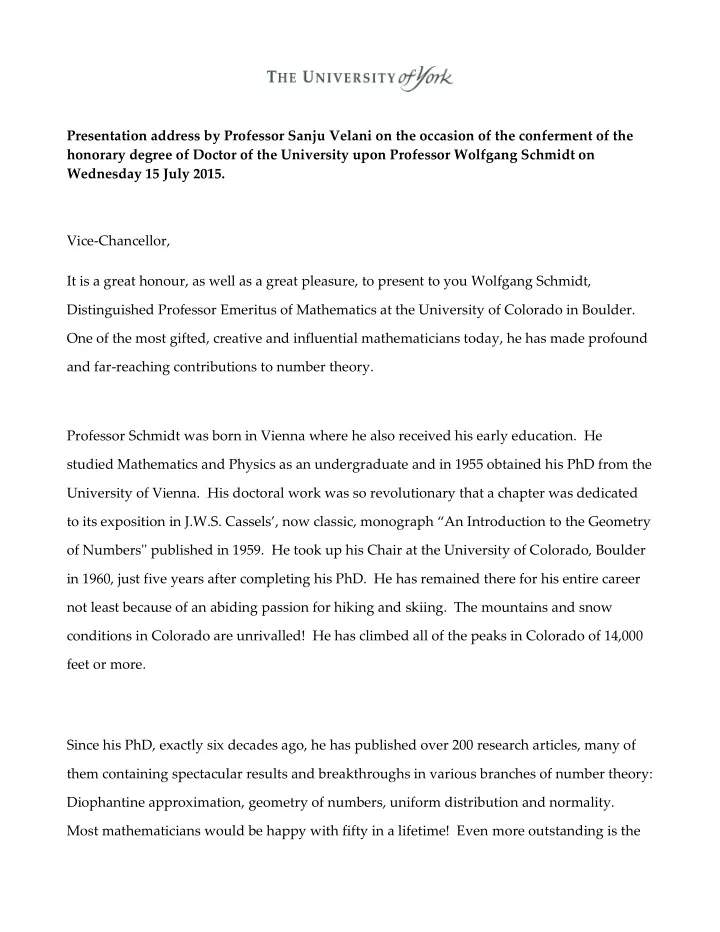

Presentation address by Professor Sanju Velani on the occasion of the conferment of the honorary degree of Doctor of the University upon Professor Wolfgang Schmidt on Wednesday 15 July 2015. Vice-Chancellor, It is a great honour, as well as a great pleasure, to present to you Wolfgang Schmidt, Distinguished Professor Emeritus of Mathematics at the University of Colorado in Boulder. One of the most gifted, creative and influential mathematicians today, he has made profound and far-reaching contributions to number theory. Professor Schmidt was born in Vienna where he also received his early education. He studied Mathematics and Physics as an undergraduate and in 1955 obtained his PhD from the University of Vienna. His doctoral work was so revolutionary that a chapter was dedicated to its exposition in J.W.S. Cas sels’, now classic, monograph “ An Introduction to the Geometry of Numbers'' published in 1959. He took up his Chair at the University of Colorado, Boulder in 1960, just five years after completing his PhD. He has remained there for his entire career not least because of an abiding passion for hiking and skiing. The mountains and snow conditions in Colorado are unrivalled! He has climbed all of the peaks in Colorado of 14,000 feet or more. Since his PhD, exactly six decades ago, he has published over 200 research articles, many of them containing spectacular results and breakthroughs in various branches of number theory: Diophantine approximation, geometry of numbers, uniform distribution and normality. Most mathematicians would be happy with fifty in a lifetime! Even more outstanding is the
fact that in this century alone, when he was past the age at which most of us would consider retiring, he has published 33 articles, some solving a longstanding open problem on recurrence sequences and some developing the new theory of ‘parametric’ geometry of numbers. In short, Professor Schmidt continues to introduce novel ideas and techniques and produce work at the very highest level. He had told me that he is no longer quite the skier he once was, however. Three examples of his fantastic creativity and vision that are still influencing current research, in particular at York, are the celebrated Schmidt Subspace Theorem; the axiomatic formulation of Schmidt Games, and the unifying aspect of Regular Systems. Apart from solving important, long-standing problems, Professor Schmidt has been widely influential in formulating new and exciting programmes of research. His conjectures have attracted the attention of many world experts, including some located here. This makes it especially appropriate that the University of York recognises his enormous, enriching and beautiful contributions to mathematics by the award of an honorary doctorate. Some of you graduating here today will have come directly into contact with Professor Schmidt's work -- two of his books are recommended texts for our fourth year number theory course. He is a strikingly clear thinker and writer. Professor Schmidt has received many honours including the American Mathematical Society Cole Prize, the Humboldt Prize and a Guggenheim Fellowship. He is the only mathematician to date to have been awarded the Austrian Decoration for Science and Art and is one of only four mathematicians invited to address the International Congress of Mathematicians three times. In addition, he is a fellow of the National Academy of Sciences, the Polish Academy of Sciences and the American Mathematical Society.
Professor Schmidt's sustained scholarly achievement, over a long career, is instructive at many levels. But one that is especially significant to mention, when so many of you are graduating and have the prospect of shaping your lives ahead of you, is that such accomplishments come from serious application over a number of years. An honorary doctorate conventionally represents an award which recognises not just a single moment of brilliance – though that may be part of what is honoured – but longer term endeavour too. Such endeavours can be successful but they can also involve hardship and failure and disheartening losses of faith. In awarding such degrees we offer the recipients to you who are graduating, as exemplars of what is possible, of the highest human endeavour and accomplishment. In so doing we remind ourselves why intellectual life, much threatened, needs to be protected and celebrated and why universities remain critical sites of possibility. Regardless of whether or not you are experts in the disciplines from which our distinguished guests come, you will all be able to recognise what they represent in these terms. I hope that the example of Professor Schmidt will be one you will take with you into whatever you choose to do in the future. Vice-Chancellor, I have the honour to present to you Professor Wolfgang Schmidt for the award of Doctor of the University, honoris causa .
Recommend
More recommend